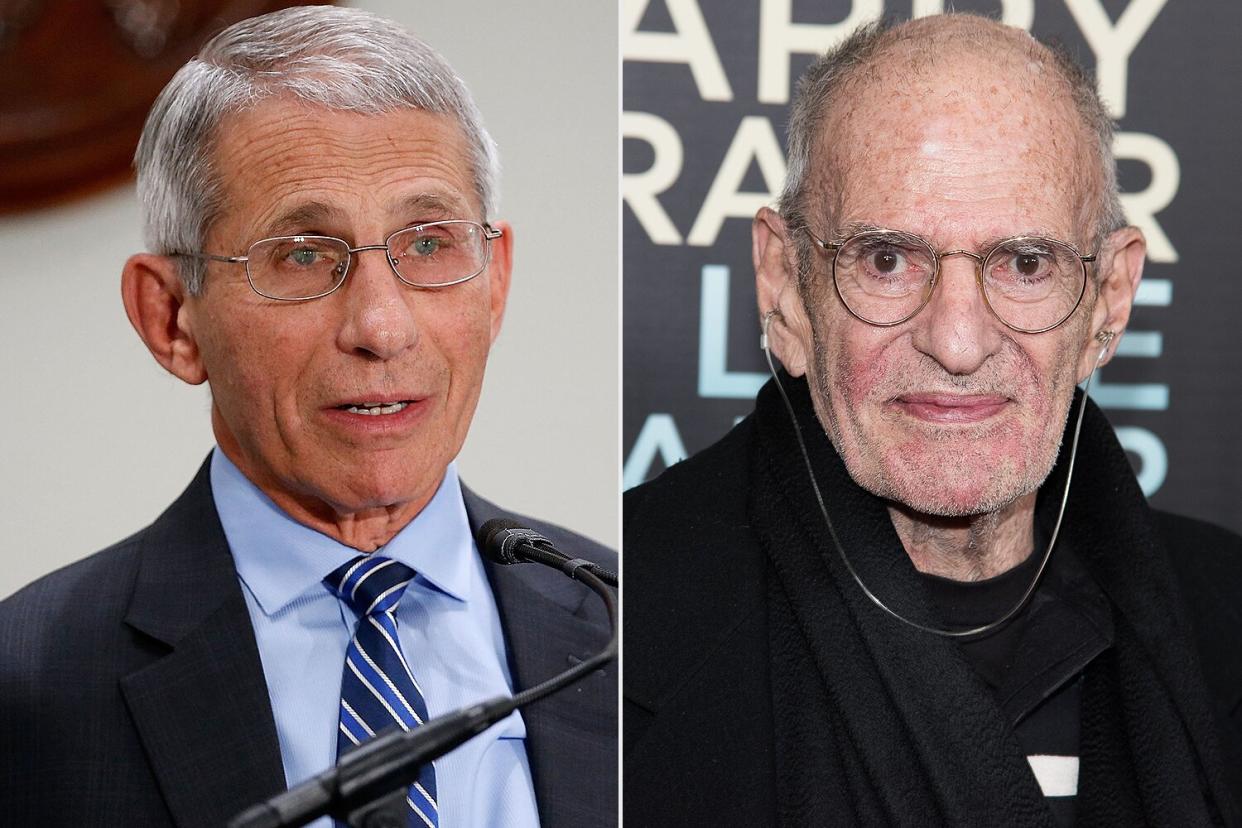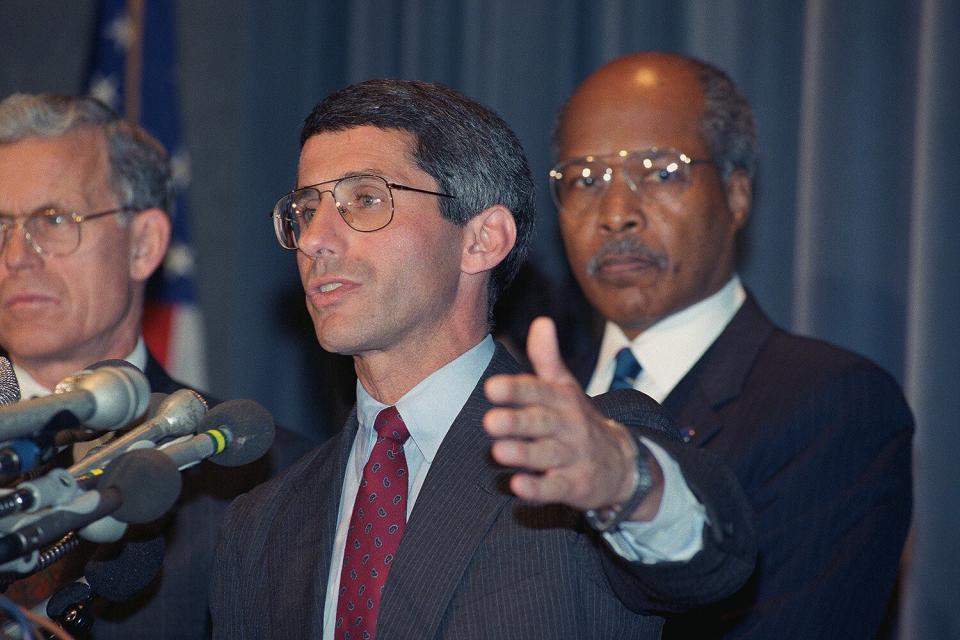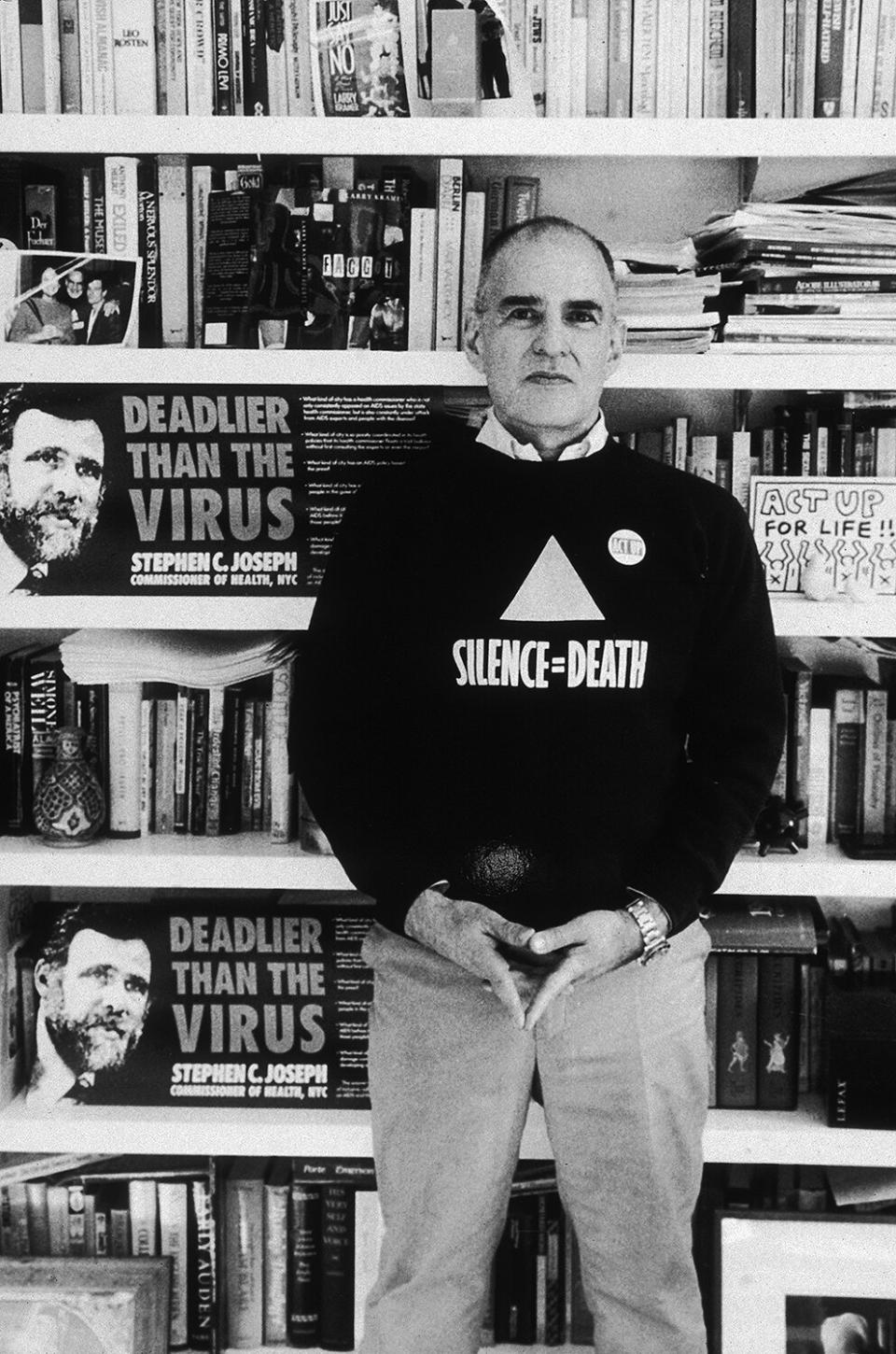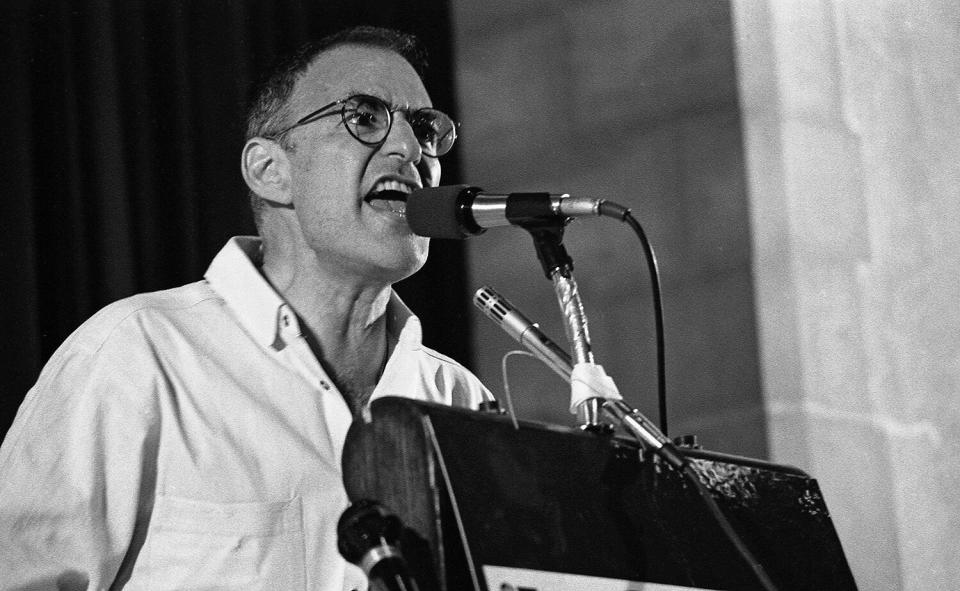Looking Back at Dr. Fauci's Enduring Bond with AIDS Activist Larry Kramer — and Their Final Phone Call

Paul Morigi/Getty; Dave Kotinsky/Getty Dr. Anthony Fauci (left) and Larry Kramer
The last time Larry Kramer spoke with Dr. Anthony Fauci — his longtime friend and even longer rival — Kramer was not far away from death. But that had long been true of America’s most famous AIDS activist.
“It was clear that he was very weak and he sounded very fragile on the phone,” Fauci, 79, told Variety on Thursday, recalling his call some 10 days before to congratulate Kramer on a recent award.
“We chatted for a few minutes, but he was tired,” Fauci said. “The one thing I feel really good about now is that the last thing he said to me when he hung up the phone was ‘I love you, Tony,’ and I said, ‘I love you too, Larry.’ ”
For decades the two of them have been linked: Fauci, director of National Institute of Allergy and Infectious Diseases since 1984 and now in the spotlight as the public face of the White House’s coronavirus task force; and Kramer, who became an increasingly loud and unceasing voice about the ravages of the HIV/AIDS epidemic that, in the ’80s, began killing people by the tens of thousands in the U.S.
“In American medicine, there are two eras: before Larry and after Larry,” Fauci once told The New Yorker. “There is no question in my mind that Larry helped change medicine in this country. When all the screaming and the histrionics are forgotten, that will remain.”
On Wednesday, Fauci told The Washington Blade, his phone pinged with a text: Kramer had died of pneumonia. He was 84.
Soon after getting word, Fauci called another activist who had alerted him and “we both were in tears,” Fauci told the Blade.
“He was,” Fauci said, “truly an icon.”
• For more on Larry Kramer's life and legacy and a special remembrance of him by actor Matt Bomer, subscribe now to PEOPLE or pick up this week's issue, on newsstands Friday.
Kramer's signal reform, according to Fauci, was in helping change how regulators and researchers approached treatment: No longer would they dictate an inflexible process to the affected patients, regardless of need. Instead, the same people who were sick would also be consulted as medicines were created and tested. There was, as Kramer insisted, no time to waste.
“I’ve had an interesting, unusual — and, in some respects, wonderful — journey with Larry over the years,” Fauci told the Blade. “Since I was in his mind a representative of the government that he felt wasn’t moving quickly or well enough with HIV, we started off in somewhat of an adversarial role where he was attacking me for any number of reasons. And then as we got to know each other and realized that we both had a common goal that we shared, we became acquaintances, then friends, then really, really close friends.”
That is hardly how their relationship began.
“God, I hated him,” Kramer told The New Yorker of Fauci in 2002. “As far as I was concerned, he was the central focus of evil in the world.”

Getty Dr. Anthony Fauci in an undated photo

Alex Wong/Getty Dr. Anthony Fauci in 2001

Sara Krulwich/New York Times Co./Getty Larry Kramer in 1989
In June 1988, Kramer declared in an open letter in The San Francisco Examiner that Fauci, who had been a director at the National Institutes of Health for four years, was a “liar” and a “murderer.” Fauci, he wrote, should be “put before a firing squad” for how he had handled — or rather mishandled — the government’s response to the spreading plague, which had already killed more than 60,000 people, many of them gay men like Kramer.
“I mean that got everybody’s attention, particularly mine,” Fauci said in a 2015 HBO documentary about Kramer.
“I was, in his mind, the face of the federal government, so if he wanted to lash out at the federal government, who would he lash out to?” Fauci said. “And it was me.”
An encounter at an AIDS conference in Montreal in 1989 marked a “major turning point” in their relationship.
As Kramer told PBS, with characteristic candor: “I was out walking my dog at night, and here comes Dr. Fauci going for a walk with one of his assistants — I forgot his name — a gay man whose job as far as I could see was to keep people away from Dr. Fauci, especially people like me. It was an historic meeting, because somehow we talked as we walked with my dog, Molly.”
The two kept talking: at a lunch with other activists and then at a larger, late-night meeting back at the hotel with more people “who presented to him ideas of things that he should be doing and wasn’t.”
“He was just bowled over,” Kramer told PBS, “and he was a great enough person to know that these kids were smart. And he opened the door; he let the activists inside.”
Speaking with HBO, Fauci remembered it this way: “I ran into him on the streets of Montreal — like two generals in a war on opposites coming together for a little bit of a truce and saying, you know, ‘We’re both soldiers and maybe we’re on the same side and we’re not on opposite sides.’ “
“He was being totally opposite from the fist-raising, in-your-face Larry,” Fauci said then, “and we found out at the end of that that even though we still disagreed on how to do things, we didn’t disagree on what needed to be done.”
Kramer, founder of ACT UP and, before that, the Gay Men's Health Crisis, had for years been railing against what he called a deadly conspiracy of social, government and religious forces — some parts indifference, some parts intransigence, many parts bigotry — that together could wipe out an entire community of gay men even as HIV spread to others, despite the world’s disregard.
Fauci was a foe and then a foil for Kramer. By the early ‘90s, they described each other as friends (and a key character in Kramer’s 1992 play, The Destiny of Me, is modeled on Fauci), but still they sparred.
During an appearance together on CSPAN in 1993, Kramer said Fauci was peddling “bureaucratic b-------” in defending the government’s progress on AIDS treatments.
“Tony, more than anyone in this world, knows how awful everything is, knows what has to be done and yet he can never say it in public like I can say it in public,” Kramer said then.

Catherine McGann/Getty Larry Kramer in 1987
Fauci has recalled how, during another appearance, this time on Nightline, “All of a sudden Larry starts trashing me. He says I’m a disgrace. That I’m doing this, and that I’m doing that.”
“And I’m saying to myself, ‘What’s going on with Larry?’ He made it look like we were mortal enemies,” Fauci told STAT, a health news website.
“About 15 minutes after I got home, the phone rang. It was Larry,” Fauci recalled. “He said, ‘That was really great, wasn’t it, Tony? We really did well.’ I said, ‘What do you mean we did well?’ He answered, ‘We made our point.’ I said, ‘I know, Larry, but you called me a dirty rat in front of 10 million people on Nightline.’ “
That was Kramer’s point, though: “He thought that people were losing attention about the importance of HIV,” Fauci said. “He figured that a good way to get attention was to trash Tony Fauci in front of 10 million people.”
After Kramer received a liver transplant — in addition to HIV, he’d had hepatitis B for years – Fauci was involved in getting Kramer access to “a lifesaving experimental drug trial,” according to The New York Times.
"I actually helped in his medical care," Fauci told Variety. "I was a consulting physician for him and helped connect him with the appropriate people to get the liver transplant that saved his life several years ago."
They spoke by phone and traded emails and often had dinner when one or the other was in New York City or Washington, D.C.
Even so, “The thing about Larry that’s very unusual is that even in the context of a very deep, dear affection for each other, he still wouldn’t hesitate to publicly start trashing me,” Fauci told Variety. “He would do it almost tongue-in-cheek.”
In 2015, Kramer wrote a column for The Advocate excoriating federal health officials including Fauci for failing to deliver on a cure for AIDS. And, in 2018, Kramer said he was “the consummate manipulative bureaucrat who speaks out of too many sides of his mouth.’’
In a brief response at the time, Fauci said, in part: “Although Larry can be confrontative and combative, I consider him a friend and a hero of the AIDS activist movement.”

Melanie Burford For The Washington Post via Getty Larry Kramer in 2012

Evan Vucci/AP/Shutterstock Dr. Anthony Fauci
In an interview with the Times this spring, before he died, Kramer said he and Fauci were "friends again" — if their friendship had ever ended — and that Kramer was "feeling sorry for how he’s being treated," amid the novel coronavirus pandemic, which had made Fauci a household name.
“I usually correspond with him after he appears on television,” Kramer said to The Daily Beast in March. “He just says, ‘Hunker down.’ I tell him, ‘You’re looking tired.’ ”
Speaking with PBS for a retrospective on AIDS in America, Kramer spoke of Fauci with less vinegar and more warmth. The doctor, he said, had become the only true and great hero in all of this, in the government, in the system.
“I acknowledge him every chance I can,” Kramer said then, “because we certainly got off to a rocky start.”


